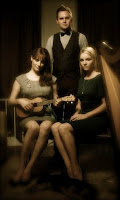The following is a simple Brassens song which a lot of French people know from their primary school days. It tells the true, sad story of the death of the pet female duck of his friend Jeanne Planche. Mme Planche had given Brassens a temporary home many years ago that he never got round to leaving. The solemn, slow rhythm makes the song a funeral march and the sentiments expressed for the deceased tell how deep was her sense of loss.
Brassens knew, however, that Jeanne had originally bought this duck for them all to eat but she hadn’t had the heart to do it. In cold reality, non vegetarians must, of necessity, have limits to their sensitivities.
I think we gather that Brassens, although a great animal lover himself, is having a gentle tease at the expense of this soft-hearted woman of whom he was so fond. ( Click here to see my account of thestory of Brassens and Jeanne )
JEANNE'S PET DUCKLING
La cane
De Jeanne Est morte au gui(i) l'an neuf, Elle avait fait, la veille, Merveille ! Un oeuf ! La cane De Jeanne Est morte d'avoir fait, Du moins on le présume, Un rhume, Mauvais !
La cane
De Jeanne Est morte sur son oeuf Et dans son beau costume De plumes, Tout neuf ! La cane De Jeanne, Ne laissant pas de veuf, C'est nous autres(ii) qui eumes Les plumes, Et l'oeuf ! Tous, toutes, Sans doute, Garderons longtemps le Souvenir de la cane De Jeanne Morbleu ! |
The duckling
Of Jeanne
Died upon New Year’s day.
It had made, on the Eve
Mirac’lous!
An egg!
The duckling
Of Jeanne
It died from having caught
At least so we presume,
A cold
Serious!
The duckling
Of Jeanne
Died upon its egg
And in its fine costume
Of feathers,
Brand new!
The duckling
Of Jeanne
Leaving no widower
It was just us who got
The feathers
And th’ egg!
One and all
Don’t doubt it
We’ll retain for years the
Mem’ry of the duckling
Of Jeanne
Good grief!
|
In translation the vocabulary is simple but it is the rhythm that counts:3-3-6-7-3-2 to convey the sense of a slow funeral march. Brassens achieves this also by lingering on final syllables.
TRANSLATION NOTES
(i) au gui = at the mistletoe. At the New Year, the tradition is to kiss under the mistletoe to wish good luck.
(ii) nous autres = us lot - in expressions such as this"autres" is being used for emphasis with no sense of "other". Robert gives the example:
Nous autres Francais, nous aimons la bonne cuisine - We French love good cooking.
(iii) Morbleu ! We have to end with an oath. This is an old-fashioned oath that French children would not be familiar with. Collins Robert suggests “Gazooks” as a translation. Even if the rest of the song is put into English, I would like to keep the despairing French oath for effect. Some critics think it is a cry against human mortality. I think it is despair about how long Jeanne is going to go on about her sweet little duck.
“LA CANE DE JEANNE” IN PRIMARY SCHOOLS
La Cane De Jeanne -Hommage Brassens Ecole Chantemerle
Uploaded by yocot73. - Independent web videos.
Please click here to return to the alphabetical list of my Brassens selection.
A private note for my primary schoolteacher daughter, Katharine.
If I was turning this into a French presentation for Parents' evening, I would think of dividing it into three parts.
Part one: The children's presentation.
I would borrow some of the artwork fom the French video. I like the duck being only intermittently dead! If when the children bring their work to the central display, they can do a kind of slow march for the first two and last two lines, that would be clever. At some point a big egg is put on a separate stand and is left there.
Part two: the music teacher turns to the parents and tells them that the roles are going to be reversed and they are going to be the performers and the children are going to applaud them if deserving.
The chidren give out sheets with the copy of the song in English. The music teacher gives them a brief rehearsal of the first verse stressing the importance of the rhythm with excessive stress put on the "eu" endings. The parents then sing the whole song with the music teacher stopping for a repeat if the parents miss an "eu".
The music teacher should insist that the parents say the final oath - which contains the last "eu" sound with feeling.
The children finally give the applause that is merited.
Part three: the previous part is meant to be lighthearted and noisy, ready for a change of mood in this section.
The teacher sees that all the artwork has been cleared from the stage, but that the egg has been forgotten. The teacher selects a child and says:
"Anne, we have forgotten the egg of the Cane de Jeanne. Would you mind bringing it to me?"
The child goes up to the egg and makes to get hold of the artwork. Suddenly she stops and puts her ear to the egg.
The teacher asks what is wrong.
"I can hear a tapping sound", the child replies. Immediately she stands in front of the egg hiding it from the audience. Unseen, she removes the top part of the egg. Then she steps aside to show the egg to the audience and points to the egg saying:"Look what was in the egg of the Cane de Jeanne!"
The broken egg now has the face of a happy chick on show. -I would borrow that picture from the French video.
If our dramatic timing is good we have moved from the theme of death to re-birth.
Click here to return to the full index of Brassens songs on this blog





